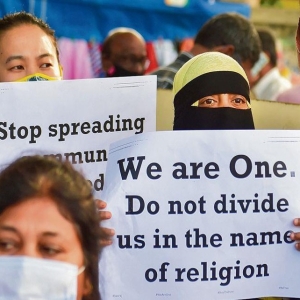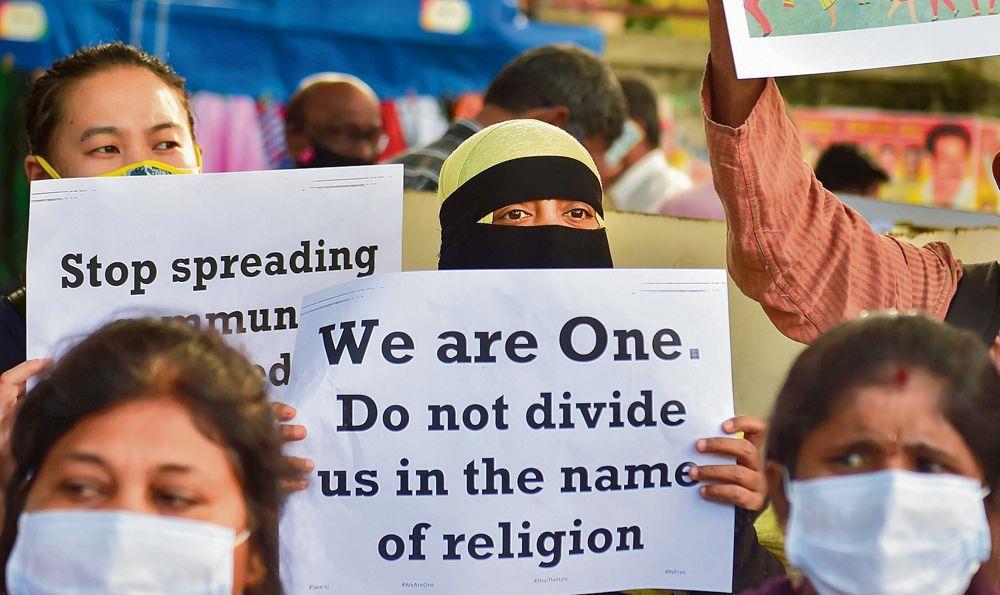
.png) Jacob Peenikaparambil
Jacob Peenikaparambil

Two national festivals have always been celebrated with much fervour and enthusiasm: Independence Day and Republic Day. But Republic Day 2024 is of extraordinary note because it is followed by a highly publicised and state-sponsored pran pratishtha of Ram Mandir in Ayodhya. In the words of Pratap Bhanu Mehta, "It is not just a moment where the state, which has pulled all its mighty power behind this event, ceases to be secular. It is also the moment where Hinduism ceases to be religious". Instructed by the Sangh Parivar organisations and the BJP government at the centre and in the states, a Diwali was celebrated in many parts of India. The celebration of Republic Day 2024 could be lacklustre in the backdrop of the mega event of the consecration of the newly built Ram Mandir in Ayodhya.
Republic Day is celebrated on January 26 as a national festival because it is the day the Constitution of India became operational, although it was adopted by the Constituent Assembly on November 26, 1949. Hence, it is a day to introspect whether the country and its rulers are faithful to the core values and ideals of the Constitution. It is a day to assess how far the goals of Independent India have been achieved. It is also a day for Indian citizens to renew their commitment to work for a peaceful, harmonious and prosperous India by being faithful to the Constitution.
Against the backdrop of what has been happening in India during the last decade, many doubts about Indian democracy and the country's future arise among the citizens committed to the principles, ideals and provisions of the Indian Constitution. The first and the most crucial question is whether India has been faithful to its ideals? The core principles or ideals of the Indian Constitution, as enshrined in the preamble, are Secular Democracy, Justice, Equality, Liberty and Fraternity that ensure the dignity of the individual and the unity of the nation.
The judgement of the Kesavananda Bharati case (1973) highlighted the concept of the "basic structure" of the Indian Constitution. The court said that the "basic structure" of the Constitution cannot be amended by the parliament. At the same time, the judgement did not specify or define what is meant by the basic structure. The later SC verdicts developed the various aspects of the basic structure. Supremacy of the Constitution, federal and secular character of the Constitution, unity and sovereignty of India, democratic and republican form of government, separation of power, individual freedom, the rule of law and free and fair elections come under the ambit of 'basic structure'.
This write-up critically examines only a few aspects of the "basic structure". First and foremost is the virtual disappearance of the secular character of the Indian state as displayed in the consecration of the newly built Ram Mandir in Ayodhya and the build-up for the event. According to the Constitution, India is a secular country with no state religion, and the state is expected to respect all faiths without discrimination against any religion. The vague and all-pervasive anti-conversion laws passed by the BJP governments and their misuse by the governments and right-wing groups to harass minorities is a violation of the Constitution of India.
The Supreme Court of India, in its judgement on the Ayodhya dispute, said that the destruction of Babri Masjid, the disputed structure, was an egregious violation of the rule of law. Still, the land in dispute was given to the party that was responsible for the destruction of the mosque. The government of India and the UP state government played a vital role in constructing the temple. The Prime Minister of secular India was the principal celebrant of the foundation ceremony and the pran-pratishtha on January 22, 2024. The 'pran pratishtha' or consecration of the new idol of a five-year-old Ram was performed by Modi along with Rashtriya Swayamsevak Sangh (RSS) chief Mohan Bhagwat. The four Shankaracharyas were conspicuously absent.
The opposition parties have alleged that the consecration of an incomplete temple with the prime minister as the celebrant just before the Lok Sabha election is a political event. They have quoted the statements of two Shankaracharyas to support their stand. The BJP state governments left no stone unturned to make the consecration of Ram Temple a mega event. They declared either full-day or half-day holidays for government employees and educational institutions. The central government declared a half-day holiday for its employees. Authorities and political leaders pressured the management of even private schools to bring children for programmes related to the consecration of the Ram temple. Many shopkeepers and institutions were forced to hoist saffron flags with the image of warrior Ram or angry Hanuman and display replicas of the Ram temple.
Looking at the whole scenario, Pratap Bhanu Mehta, a well-known political scientist, wrote in his article, "Prime Minister Narendra Modi now donning the mantle of Hindu kingship, has the ability to get millions of people to play their parts for an audience of One, with all institutions, corporations, sects, civil society, media singing the same tune. It is a terrifying spectacle on any proper measure of democracy".
The comment of Rajeev Bhargava, another political scientist, is more telling than that of Pratap Bhanu Mehta. "We have somebody who is acting like the king and has announced that divinity is passing through him or he is chosen by God, by the divine voice to perform this ceremony. This is a total subsumption of religion by politics. The line between the religion and the state has been broken down and is breaking down entirely at the initiative of the state which is dictating how religion and religious ceremonies are to be conducted."
A portion of PM Modi's speech in Ayodhya after the pran pratishtha, as quoted in Free Press newspaper (Indore edition), proves what Rajeev Bhargava has written. "Ram is the faith of India; Ram is the foundation of India. Ram is the idea of India…Ram is the prestige of India; Ram is the glory of India… Ram is the leader and Ram is the policy."
With the consecration of the Ram Mandir in Ayodhya, the process of converting India into a Hindu Rashtra has reached a critical stage. In other words, India has become a de facto Hindu Rashtra. The word 'secular' remains only in the preamble of the Indian Constitution. It doesn't make much difference.
India's federal structure has been stressed since the BJP came to power in 2014. The central government-appointed governors in the opposition-ruled states are in permanent conflict with the state governments. Governors refuse to sign the bills passed by the state assemblies. The Tamil Nadu and Kerala state governments have complained to the Supreme Court. "Why should governors wait for the parties to approach the court? And then they start acting. Why cannot they perform their constitutional functions on their own?" remarked a bench led by Chief Justice of India Dhananjaya Y Chandrachud when the court heard the petitions filed by the two states. Not releasing funds to the states ruled by opposition parties by the central government is another reason for the conflict between the states and the centre. Many central government policies, like bringing cooperative societies under the concurrent list from the state list, are another example of usurping the states' powers.
The new law regarding the appointment of Election Commissioners passed by the parliament (Appointment, Conditions of Service and Term of Office) goes against the ruling of the Supreme Court that the election commissioners shall be selected by a committee comprising the prime minister, the leader of the opposition and the chief justice of India. The new law replaces the chief justice of India with a union minister recommended by the prime minister. According to legal experts, the law severely dents the impartiality of the Election Commission of India and free and fair elections that are vital for democracy.
Another area of subversion is the rule of law, which is the lifeblood of democracy. The rule of law means that no individual, president or private citizen, stands above the law, and the law should be evenly applied to all without any discrimination. Often, members of specific organisations take the law into their own hands and indulge in violence against certain sections of society; the police, instead of taking action against the hooligans, look the other way in such situations. Another violation of the rule of law is the weaponisation of anti-conversion laws, Love Jihad laws, Juvenile Justice Act and POCSO Act by the government to tarnish the image of the members of particular communities and persecute them. Bulldozer justice resorted to by the BJP government is a blatant violation of the rule of law.
Questions are also asked about the independence of the judiciary, passing laws without sufficient or any discussion in the parliament (e.g. Three criminal laws were passed when 97 opposition members were suspended in the lower house), violation of fundamental freedoms and rights by misusing the draconian laws like UAPA, sedition law, National Security Act etc.
What could be the reasons for the erosion of the core values of the Indian Constitution? Two points mentioned by B R Ambedkar in his last speech in the Constituent Assembly are very relevant to today's Indian scenario. According to Ambedkar, however good a constitution may be, it is sure to turn out badly because those who are called to implement it happen to be a rotten lot. Secondly, Bhakti or hero-worship is a sure road to degeneration and eventual dictatorship.
The root cause of these two aberrations is the failure to educate the people of India about the ideals, values and principles of the Indian Constitution, primarily through education. The main culprit is the party that ruled the country for 54 years. Now, it is paying a heavy price for its negligence. If a large section of the Indian population has become blind devotees of a divisive ideology, it is due to the failure to instil critical thinking in them.